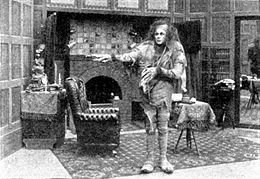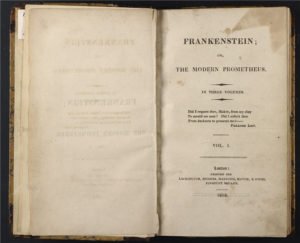Frankenreads Q&A: Harvard University
We continue the Frankenreads Q&A series today by presenting interviews with Professor Deidre Lynch and Leslie A. Morris, organizers of Frankenreads at Harvard University.
The first interview is with Deidre Lynch, Ernest Bernbaum Professor of Literature at Harvard University.
What made you want to participate in Frankenreads, and what do you think is the relevance of Mary Shelley's iconic novel today?It’s great to celebrate a woman’s achievement! At a moment in our culture when women seem to have trouble getting heard, it seemed very important to commemorate the bicentennial of Frankenstein and to acknowledge how Shelley’s book forever transformed our ideas of horror, of science and the technological transformation of nature, and of women’s writing and the Gothic novel. And it’s difficult to under-estimate its topicality. This semester Frankenstein begins my undergraduate lecture course at Harvard on 'Modern Monsters'. As my students were quick to recognize, if we think of Shelley’s 19th-century monster story as hinging on successive failures to recognize likeness and kinship, it is very apparent that it speaks very eloquently to our own 21st-century moment of refugee crises and dehumanizing xenophobia. What are you doing for Frankenreads, who is involved, and what makes your Frankenreads event unique?My contribution to Frankenreads is 'The Afterlives of Frankenstein: Extinction, Emergence, and the Haunted Screen', a symposium I’ve organized on Mary Shelley’s cinematic legacy. It will take place on October 26th at Harvard’s Barker Center; it’s happening in conjunction with a film series at the Harvard Film Archive. There will be six speakers at the symposium: in alphabetical order, Homi Bhabha, James Chandler, Tom Gunning, Adam Hart, Jill Lepore, Moira Weigel and myself. Each speaker will be examining a different film influenced by the novel. There are many for us to choose from: Shelley’s monster has been a presence on cinema screens since 1910, when the technology of moving pictures was barely a decade old. The speakers’ charge is to explain why that is the case and to investigate together, with the help of our audience, what the monster’s many afterlives can teach us about, for instance, the power of the image, or about technologies of artificial reproduction, or about cultures’ shifting understandings of the boundary between life and death.
What are you doing for Frankenreads, who is involved, and what makes your Frankenreads event unique?My contribution to Frankenreads is 'The Afterlives of Frankenstein: Extinction, Emergence, and the Haunted Screen', a symposium I’ve organized on Mary Shelley’s cinematic legacy. It will take place on October 26th at Harvard’s Barker Center; it’s happening in conjunction with a film series at the Harvard Film Archive. There will be six speakers at the symposium: in alphabetical order, Homi Bhabha, James Chandler, Tom Gunning, Adam Hart, Jill Lepore, Moira Weigel and myself. Each speaker will be examining a different film influenced by the novel. There are many for us to choose from: Shelley’s monster has been a presence on cinema screens since 1910, when the technology of moving pictures was barely a decade old. The speakers’ charge is to explain why that is the case and to investigate together, with the help of our audience, what the monster’s many afterlives can teach us about, for instance, the power of the image, or about technologies of artificial reproduction, or about cultures’ shifting understandings of the boundary between life and death.
The following interview is with Leslie A. Morris, Curator of Modern Books and Manuscripts at Houghton Library, Harvard University.
What made you want to participate in Frankenreads, and what do you think is the relevance of Mary Shelley's iconic novel today?I felt it would be a very popular event for students, and Houghton Library is always looking for ways to let undergrads in particular know that they’re welcome here, both for events and to use our collections. Rare book and manuscript libraries can be a little forbidding—we have lots of rules! But Frankenstein is a book everyone knows, although perhaps they’ve never read it but only seen one of the many film versions—I’m hoping curiosity (and Halloween treats!) will lure some to participate. Beyond the fun factor, I hope readers go away with a greater sense of how relevant the novels is in thinking about issues we still struggle to deal with today, issues of identity and inclusion, humans 'playing God' by manipulating nature, and the consequences of action and inaction. What are you doing for Frankenreads, who is involved, and what makes your Frankenreads event unique?We’ve packed as much into Halloween as I think we could. I don’t expect that everyone will come to everything, but I think there’s such a variety of opportunities to participate that everyone will find some aspect appealing. Obviously, the marathon reading is at the core—we start when the Library opens at 9 am and (doing a somewhat abridged version) should end a little after 4 pm. We’ve also done a small exhibition from our collections so that participants and audience members can see what the first edition looked like and how the text evolved. Immediately following the reading is a 'monstrous' electricity demonstration to show some of the contemporary experimentation that may have informed Shelley’s novel. Then, that’s capped off by a showing of Young Frankenstein at the Harvard Film Archive. It’s been a very collaborative effort, involving colleagues at the Harvard Theatre Collection, Collection of Historic Scientific Instruments, and the Harvard Film Archive, as well as at Houghton. I think it will be both fun and educational!
What are you doing for Frankenreads, who is involved, and what makes your Frankenreads event unique?We’ve packed as much into Halloween as I think we could. I don’t expect that everyone will come to everything, but I think there’s such a variety of opportunities to participate that everyone will find some aspect appealing. Obviously, the marathon reading is at the core—we start when the Library opens at 9 am and (doing a somewhat abridged version) should end a little after 4 pm. We’ve also done a small exhibition from our collections so that participants and audience members can see what the first edition looked like and how the text evolved. Immediately following the reading is a 'monstrous' electricity demonstration to show some of the contemporary experimentation that may have informed Shelley’s novel. Then, that’s capped off by a showing of Young Frankenstein at the Harvard Film Archive. It’s been a very collaborative effort, involving colleagues at the Harvard Theatre Collection, Collection of Historic Scientific Instruments, and the Harvard Film Archive, as well as at Houghton. I think it will be both fun and educational!
For more information on Frankenreads events, and to find an event near you, please click here.
Follow the K-SAA on Facebook and Twitter for updates on Frankenreads events and more.


